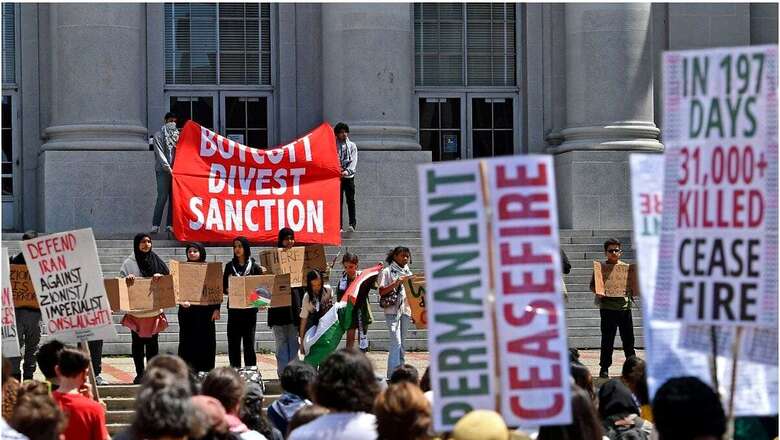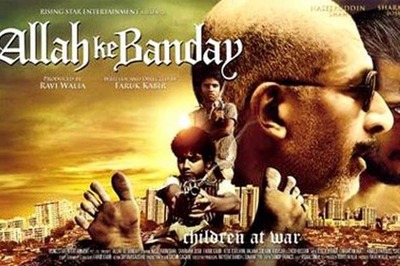
views
Since last month, two interesting events have been unfolding simultaneously. On one hand, Congress leader Rahul Gandhi is campaigning across the country with a poll pitch full of references to radical Leftist ideas, including wealth redistribution from rich to poor and the prevalence of caste dynamics in the IIT selection process. On the other hand, in the far-off United States, the state is firmly backing stringent police action against woke students and faculty members who are protesting against Israel’s offensive against Hamas in the Gaza Strip. Both of these events are happening in two different parts of the world, but there is a sinister connection that is tying them together.
Actually, to most of us, Rahul Gandhi’s Leftist avatar this poll season or Congress’ manifesto, which is more Marxist than CPI(M)’s manifesto, may look like a case of their genuine support for radical Leftist ideology. But the same cannot be said about the Western propaganda machinery pushing such ‘radical’ ideas for India; it seems to be a rabid attempt by the West to destabilise India’s growth story by drawing divisive fault lines in Indian society.
However, Rahul Gandhi needs to understand the harm his stand may incur on the nation. For instance, the Congress leader, in a widely circulated video on social media, can be seen comparing the American exam of the SAT with the Indian IIT-JEE. He starts his argument by saying that the SAT exam is designed by White people; that’s why Blacks or Hispanics aren’t able to perform well. He then goes on to compare this example of racial inequality with caste discrimination in India by saying that Dalits aren’t able to score well in IIT-JEE because the paper is set by upper castes.
Rahul’s imaginary comparison of racial inequality with caste is nothing new. Many times, this import of racial inequality theory in the Indian context of castes has been attempted in the past. But what’s problematic this time is that an Indian mainstream politician is thoughtlessly importing Western propagandistic tools to push forward his election pitch. The underlined danger of such imports can be understood clearly by those Indians living abroad who are harassed and shamed by their foreign counterparts over caste-based discrimination when no such proof actually exists.
Just last year, one such institutional attempt to deride meritorious Indians was vetoed in California when a bill was introduced in the state assembly. Also, it is not just caste that is used as a fault line to divide Indian society. There is more.
Picture this, a Financial Times report published this week on Indian elections has divided Indians into multiple categories: upper castes, other backward castes, scheduled castes, and Muslims. But here is the most controversial categorisation: this report claims that indigenous Indians are also a separate category of Indians. Which means, except for those categories of Indians, everyone else in India is a coloniser. What a preposterous claim this is! Right? Every single Indian, including religious minorities, is indigenous to India because none of them came from outside. Then what is the Financial Times’s ulterior motive in pushing the narrative that India is a settler colony? This reeks of the same sinister motive to divide India, due to which Western academics have time and again pushed the Aryan Invasion Theory (AIT).
Now the AIT may have been completely debunked by many Indian scientists and academics, but attempts to revive it during the peak of Indian elections are nothing but global Leftist intelligentsia’s wish to divide India into artificial fault lines. Such categorisation of indigenous Indians becomes much more dangerous when a politician like Rahul Gandhi uses it during poll time. Just this week, he scared off the tribals by saying that the PM wants to transfer their water, land, and forests to the industrialists. Now add the narrative of indigenous Indians as propagated by western media to what Gandhi is claiming, and we will have a social conflict brewing. In the last decade, India has made several attempts to mainstream the tribals, but such narratives once again lead to the othering of them and further take them away from development and progress.
Ironically, the same West that pushes for such radical leftist thought experiments in India is wary of similar ideas when they mushroom in their own countries. Nothing speaks of this hypocrisy more than the American state’s use of force to dismantle pro-Gaza protesters at universities. What the United States is doing to the DEI (Diversity, Equity, and Inclusion) activists in the case of anti-Israel protests pales in comparison to what it did during the 1940s and 1950s to Leftist intellectuals.
At that time, led by American Senator Joseph McCarthy, the US witnessed mass-scale persecution of suspected communists across the government sector, academics, Left-wing politicians, and even the entertainment industry. It gave birth to the term ‘McCarthyism’ which meant repression of communists and their organic intellectuals.
Even today, a strain of this hatred runs through the Americans, which rises to the surface when threats to law and order come from the Leftist camps. However, the same US, which didn’t tolerate radical leftist ideas on its own soil, doesn’t shy away from weaponising them in an Indian context.
Similarly, the Western press, which is today tacitly backing the crackdown on DEI activists on American campuses, will publish propaganda pieces on Kashmir separatism written by none other than Indian-origin columnists or academics. In fact, the anti-Israel activism that started in American universities has reached Indian shores with fresh protests at a private university in the national capital. The students of the same university had once even demanded a plebiscite in Kashmir. The blatant copy-paste of the DEI toolkit in India is dangerous, to say the least, but the involvement of mainstream Indian political parties is making it even more risky.
The author is a New Delhi-based commentator on geopolitics and foreign policy. She holds a PhD from the Department of International Relations, South Asian University. You may follow her on X: @TrulyMonica. The views expressed in the above piece are personal and solely those of the author. They do not necessarily reflect News18’s views.




















Comments
0 comment